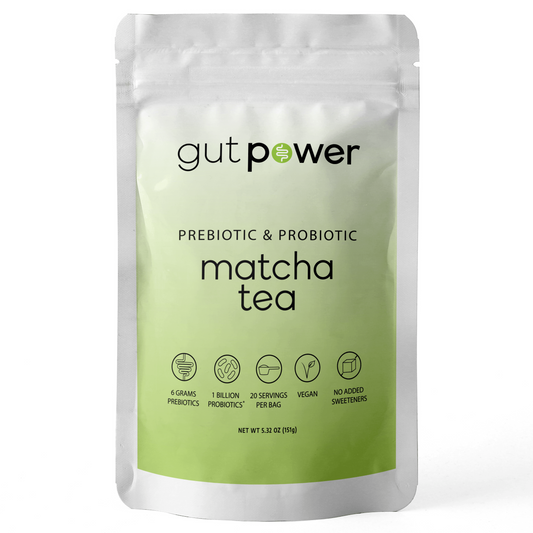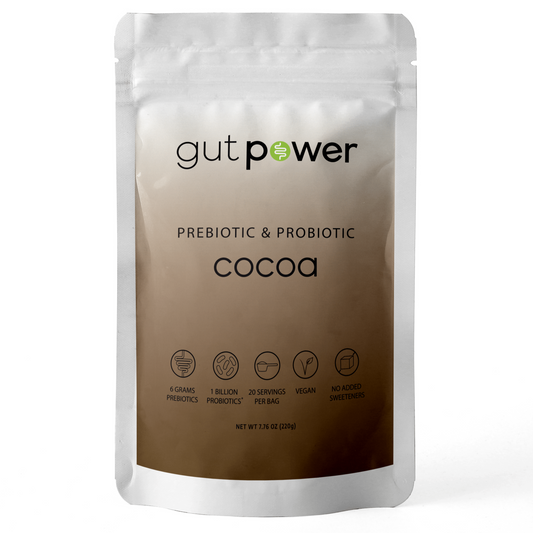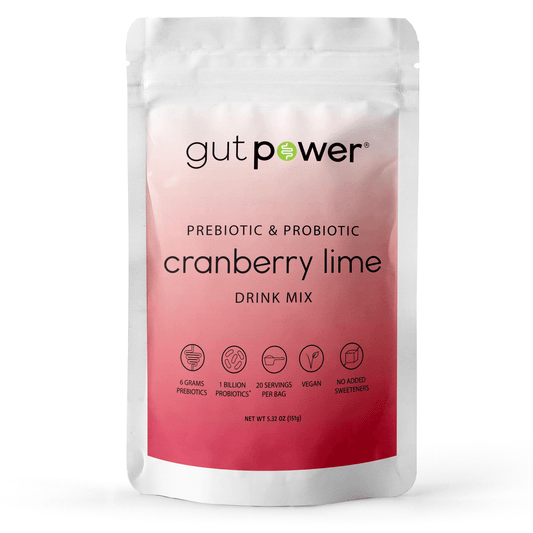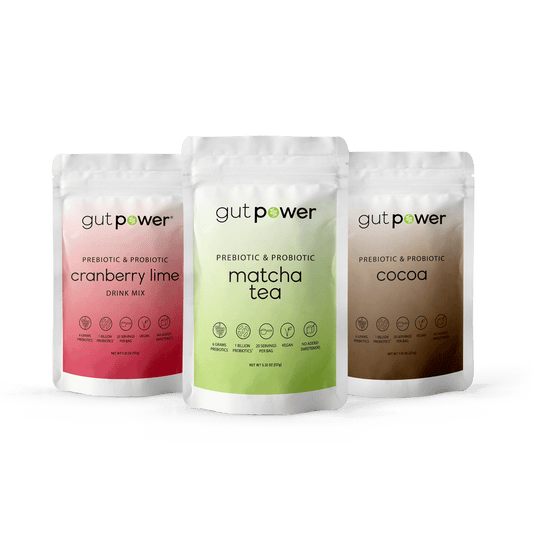From digestion to immune function, your gut is the key to keeping you healthy. We’re here to break it down into easy-to-digest (pun intended) chunks — and help you become a gut health expert in no time.
Why Does Gut Health Matter?
Your gut doesn't just digest food — it also communicates with your brain about what’s going on in the rest of your body via the gut-brain axis. In addition, your gut houses around 70% of your immune system. (1) Trillions of bacteria, viruses, and fungi live in your digestive tract, forming what we call the gut microbiome. These little guys contribute to digestion, influence your immune system, and even affect your nervous system.
What is the Gut Microbiome?
The gut microbiome is a collection of organisms that live inside your digestive tract. Each person has a unique microbiome, influenced by genetics, diet, lifestyle, and environment. Think of it as your gut's fingerprint — unique to you and different from everyone else. (2)
That said, a healthy microbiome is one that is diverse and has a balance of “good’ and “bad” organisms — an imbalanced microbiome is associated with various health problems.
Functions of the Gut Microbiome
The gut microbiome plays a role in many bodily functions, including:
Digestion and Nutrient Absorption
The gut microbiome helps break down the food you eat so you can absorb the nutrients. The digestion process begins in the mouth, where enzymes in our saliva start to break down carbohydrates. When we swallow, food travels down the esophagus and into the stomach where stomach acid breaks down the proteins. The small intestine then extracts nutrients like carbohydrates, fats, and proteins by using enzymes and microvilli. Next, the large intestine absorbs water and electrolytes and it also contains beneficial bacteria to aid in digestion. (3)
Immune System Regulation
The gut microbiome interacts with your immune system via various mechanisms to help keep pathogens out of your bloodstream, including maintaining the integrity of your gut lining and influencing gut-associated lymphoid tissue (GALT).
Synthesis of Vitamins
The organisms in your gut make essential vitamins like vitamin K, biotin, and folate. While our bodies can produce certain vitamins, such as vitamin D from sunlight exposure, the gut microbiome also contributes to vitamin synthesis. Certain bacteria in the intestines are able to synthesize certain vitamins like biotin and vitamin K allowing for a steady supply of essential vitamins. However, not all vitamins can be synthesized by the body so it’s important to incorporate nutrient-rich foods in your diet to get the rest of your needed nutrients. (4)
Brain-Gut Communication
The brain and gut are in constant communication through a network commonly referred to as the gut-brain axis. This bidirectional communication occurs via neural, hormonal, and immune pathways that are constantly giving and receiving signals. The gut, often called the “second brain” is home to millions of neurons which are heavily influenced by emotions and stress levels. This communication demonstrates the connection between gut health and mental health. It also plays a significant role in regulating digestion, mood, appetite, and even cognitive and behavioral functions. (5)
Factors Influencing the Gut Microbiome
- Diet — What you eat matters! The type and diversity of foods you consume greatly influence your gut microbiome.
- Medications —Medications like antibiotics can throw off the balance of good and bad bacteria in your microbiome, but that doesn’t mean you should ditch the meds when you need them. However, it is important to support your gut microbiome while taking them and as well as afterwards.
- Lifestyle — Stress, exercise, and sleep patterns can determine whether your gut is thriving or just surviving. If you're stressed out, leading a sedentary life, or not catching enough zzz’s, it may negatively impact your gut health.
- Environment — Early-life exposures, such as how you were born (vaginal vs. c-section) and whether you were breastfed, can shape the initial colonization of your gut microbiome. Some hygiene, beauty, and cleaning products can impact it as well.
How to Improve Gut Health—7 Tips
We’ve learned what impacts your gut, now let’s go over a few diet and lifestyle changes you can make to fix your gut health.
- Eat a variety of fiber-rich foods: Fiber fuels your gut bacteria and encourages a healthy balance between good and bad bacteria in your gut microbiome. Foods like fruits, vegetables, whole grains, legumes, and nuts provide prebiotic fiber, which feeds healthy bacteria to help it flourish.
- Consume probiotic-rich foods: Probiotics are the beneficial bacteria found in your gut. Fermented foods such as yogurt, kefir, sauerkraut, and kimchi contain naturally-occurring probiotics. Consuming more of these in your diet can help increase counts of healthy bacteria in your microbiome.
- Stay hydrated: Drinking enough water is essential to proper digestion, waste elimination, and gut barrier integrity.
- Limit processed foods and added sugars: Eating ultra-processed food and excess sugar can lead to an imbalance in the gut microbiome, which is associated with a multitude of chronic health conditions.
- Manage stress: Chronic stress can negatively impact your gut health. It’s important to find healthy ways to manage your stress with things such as exercising, meditating, or engaging in hobbies.
- Focus on quality sleep: Your gut loves a good night's sleep! Aim for 7-8 hours of quality sleep each night. Create a relaxing bedtime routine to help you wind down after a long day.
- Get moving: Exercise increases bacterial diversity—an important factor in a healthy microbiome—and increases counts of healthy bacteria that produce short-chain fatty acids (SCFAs), which have health-promoting effects on the body. Find activities you enjoy, whether it's a brisk walk, a fitness class, yoga, pilates, or other sports.
Gut Health Supplements for a Healthy Microbiome
The best supplements for gut health are ones you’ll actually take, which is why we’ve focused so heavily on delicious gut health drink mixes here at Gut Power. Gut Power drink mixes are the perfect addition to your morning routine with a boost of the prebiotics and probiotics that are so important for digestive wellness.
Try the best gut health supplements you’ll actually take today:
Gut Power Matcha is an invigorating prebiotic and probiotic-packed drink mix made with organic matcha from Japan. Experience the refreshing taste of this powerful blend and unlock the potential of your gut health with every sip.
Chocolate AND a healthy gut? Count us in. Feel good about nourishing your body with our Gut Power Cocoa prebiotic and probiotic drink mix.
Looking for a revitalizing and thirst quenching summer drink? Look no further than Gut Power’s tangy cranberry-lime drink mix that combines the natural goodness of cranberries and lime with the benefits of prebiotics and probiotics to support digestive health





